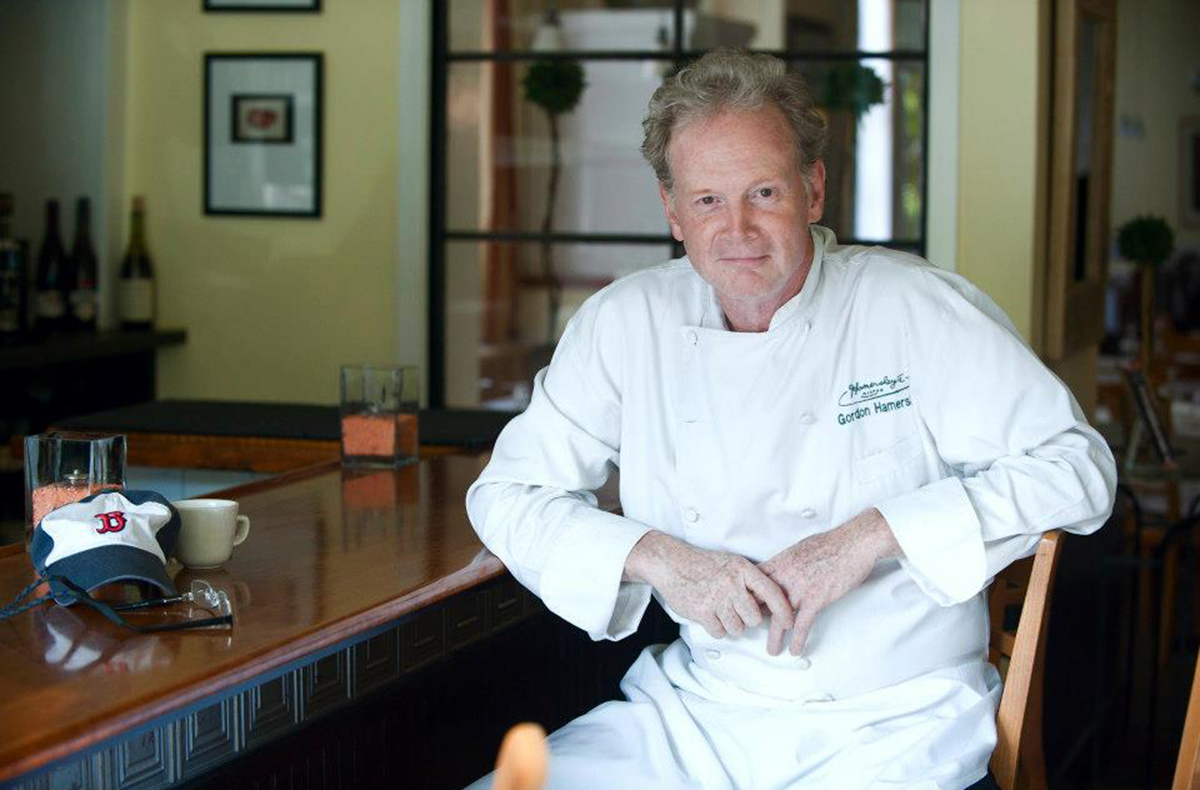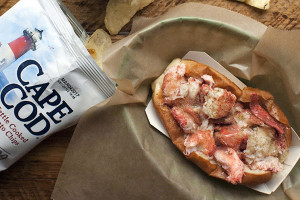Gordon Hamersley on Staying Motivated 27 Years Later

Gordon Hamersley/Photo courtesy of Facebook/Hamersley’s Bistro
Gordon Hamersley is one of the first real breakout stars from the Boston culinary scene. Winner of countless accolades and a constant presence on Julia Child’s Cooking with Master Chefs in the 1980s, Hamersley is still racking up legions of foodie devotees. Unlike other celebrity chefs, though, the hometown star can still be spotted—even during the dreaded brunch rush—in the Hamersley’s Bistro kitchen cooking in his trademark Red Sox cap. Open since 1987, Hamersley’s Bistro has again been nominated for a James Beard Award for Outstanding Restaurant.
We caught up with the chef to discuss Boston’s ambitious restaurant scene, the personalities who have had the biggest impact on his career, and his keys for staying motivated after almost four decades in the business.
First of all, congratulations on another James Beard nomination. How does it feel to be consistently recognized after so many years in the business?
The kudos goes to the entire Hamersley’s team. Remember we have been in this position for the same award a few times in years past. Also, the long list is a very long list, but just being recognized is an honor and we hope for the best. Hey, our cooks and servers are excited, as they should be, and if we make the next step, I’ll be very pleased.
You’ve worked with a number of great chefs over the years [Wolfgang Puck, Lydia Shire, Julia Child]. Who has been your biggest culinary inspiration?
Probably the chef I was most influenced by as a young cook, the one who cooked closest to how I cook today, was Claude Segal who was at Ma Maison after Wolfgang Puck. Unfortunately Claude passed away a few years ago, but he was the one who first showed me how fulfilling simple French country cooking was to cook and eat. He was a master at simplicity and presented his food with a natural elegance.
Wolfgang introduced me to the rigors of cooking for a super demanding crowd. It was terrific to be able to watch him at the start of his rise to real stardom at Ma Maison. Lydia [Shire] was a gas to work with at the Bostonian. I loved Andre Soltner, who owned Lutece in New York. Soltner taught me that my true role as an owner and chef is to be in the restaurant’s kitchen night in and night out.
But I guess Julia [Child] was the one who taught me the most. She told me to ‘Stay true to my instincts and don’t be affected by trends for trends sake.’ In the early days (of Hamersley’s Bistro), she used to call me at home the morning after eating at my restaurant with a list of things she felt should be better. There’s nothing quite as motivating as being criticized by Julia Child at seven in the morning. Yikes!
How do you stay motivated?
I’ve never had an problem staying motivated. I’m driven by my love for making our place run well and cooking what I hope people think is great food. I’m motivated by the guests who come in often and want to have something different every time. In the end, I’m motivated by cooking food that makes me happy. If I didn’t want to eat it, it wouldn’t be any good.
How has the Boston restaurant scene changed since you began?
Crazy isn’t it? I began cooking in Boston in the mid-1970s, left in 1979, and returned from France in 1983. The food was just beginning to get interesting in the early ’80s and it’s just continued to evolve. We have a large choice as diners today, and I’m thrilled that we keep getting better at what we do as a culinary town. Boston and Cambridge are great, diverse places to eat now, and that wasn’t always the case.
Chicago’s Grant Achatz told Eater that he was jealous of the Boston culinary scene because of its firm grasp of “regionality.” How do feel about that?
I think our region is defined by our unique ingredients—seafood obviously being at the top of the list—our short growing season, and our diverse ethnic population. These things are what binds us as a community of chefs. We each interpret those traditions in unique ways and, by giving a nod to our historical past, we help create a dynamic culinary scene that will carry forward into the future. That’s how regional cuisine is supposed to grows and evolve. I think we’re doing that in New England, finally.
There seems to be a new guard of ambitious chefs like fellow nominee Tim Maslow and Alden & Harlow’s Michael Scelfo. Have you had the opportunity to explore some of these new restaurants?
I don’t get out as much as I’d like, but I love what Mike Pagliarini is doing at Guilia. He makes great, simple Italian food (and it I guess it doesn’t hurt that he began as an intern with us!). I also like Matthew Gaudet’s food at West Bridge. I had a remarkable dinner there last year.
Given your perseverance in the industry, what kind of advice would you give to the younger guard?
Food to me isn’t a fashion trend. It should be an honest expression of what tastes good to each chef. Chefs need to work for a bit of time to find their true culinary rhythm. A natural audience for what they are cooking will follow. If you’re influenced by trends, then your food won’t have your own true spirit and you end up playing follow-the-leader. My advice is: cook your own food, be honest, treat people as you’d expect to be treated, and stay focused on your goals. If your goal is to run around the globe as a TV star, then have a really good chef de cuisine at home.
Sticking with that thought, most restaurants tend to have relatively short existence. How do stay true to your vision without growing stale?
Well first of all, most restaurants in Boston have a pretty long existence. This is not New York. To be in business like we have for 27 years, you have to be patient and stay focused. Also, I like complainers! I listen very carefully to those who criticize us. I want to understand what they didn’t like and then consider what I need to do to win them as customers. But servers are the key to long-term success. Many chefs undervalue the people serving their food.
How tempting is it to change up your menu?
I definitely have a style that is mine and people know what it is, by and large. The key for me is changing everything and not changing a thing. We have a few dishes that always are on our menu. But beyond that, we change everything often. The whole menu changes four to five times a year based on what’s in season and what I feel like cooking. Experimenting with new ideas is key. I am cooking for two distinct groups of diners: those who have the same thing every time they visit us and those that demand new dishes. And I love both groups.

